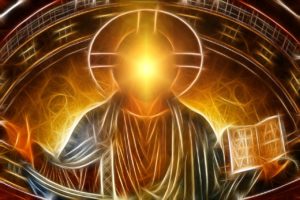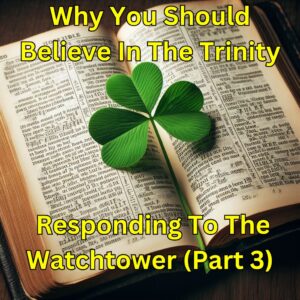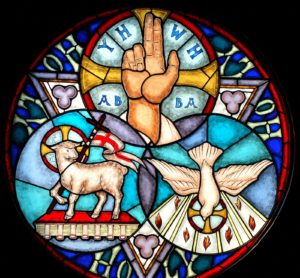Modalism is a heresy that some people have fallen into, like the Oneness Pentecostals, for example. Modalism is the view that there really aren’t 3 persons of the Trinity, but just 1 person of The Trinity who goes through different “modes” of existence. Just as a man can be a father, a son, and an employee, so also God is the Father, the Son, and the Holy Spirit. The Christian church condemned this view as a heresy a long time ago, and I believe they were right in doing so. Modalism is at odds with the scriptures. Now, don’t get me wrong here. I’m not denying the deity of Christ. The Biblical evidence that Jesus is God incarnate is overwhelming. What I’m saying is that while yes, Jesus is God, no, He is not God The Father. Jesus is God The Son; a distinct person of the Godhead. God is one divine entity that consists of 3 persons.
There are 5 arguments I want to give in this article that go to show that modalism if false.
1: Jesus’ Prayer Life Makes No Sense If He Is The Father.
The gospels depict Jesus on several occasions praying to God The Father. For example, Jesus prayed to The Father prior to the raising of Lazarus (read John 11:41-42), Jesus prayed to the Father as an instruction to His disciples on how they should pray (Matthew 6:9-13), the gospel of John records a very lengthy prayer of Jesus to the Father at the last supper (see John 17:1-26), and Jesus prayed to the Father in the garden of Gethsemane right before His crucifixion (see Matthew 26:36-46, Luke 22:39-46, Mark 14:32-42). Moreover, Hebrews 5:7 says “During the days of Jesus’ life on earth, he offered up prayers and petitions with loud cries and tears to the one who could save him from death, and he was heard because of his reverent submission.”
Jesus prayed to the Father, but this makes little sense on Modalism. On Modalism, Jesus is The Father. On Modalism, Jesus is The Father, The Son, and The Holy Spirit. If Modalism were true, then we would have to conclude that whenever Jesus prays, He’s literally talking to Himself.
Modalism reduces Jesus to this weird individual who goes around talking to Himself and calling Himself “Father”. What would you think of me if I told you “Evan Mintonis my father.” and then proceeded to ask Evan for help saying “Evan, I need 20 bucks. Please lend me some.” You’d think I was a mad man. But you wouldn’t think that if I did the same with Ron Minton (my Dad’s name). We’re two different persons, so for me to call him “father” and ask him for 20 bucks is no big deal. You wouldn’t think twice about it. I’m not saying Jesus’ prayer life is irrefutable proof of the Trinity, but what I am saying is that His prayer life makes more sense when viewed through Trinitatian lenses rather than oneness lenses.
2: Jesus’ Appeal To The Two Witnesses Law.
Later, Jesus strived to align with the Law Of The Two Witnesses. In a Jewish court, a testimony required two witnesses. To validate His testimony before the Jewish people, Jesus said that He had two witnesses to verify His claims. He said, “I am He who testifies about Myself, and the Father who sent Me testifies about Me.” (John 8:18).
As Richard Bushey of ThereforeGodExists.com once put it; this would be like standing before a judge and saying “I have three witnesses who will testify for me. Me, myself, and I.” Would the judge hearing your case think you were actually offering 3 witnesses? Of course not. Everyone would see that by your response, you were really only offering 1 witness that went by 3 different names. Jesus saying that He and The Father count as two witnesses only makes sense on Trinitarianism.
As Richard Bushey of ThereforeGodExists.com once put it; this would be like standing before a judge and saying “I have three witnesses who will testify for me. Me, myself, and I.” Would the judge hearing your case think you were actually offering 3 witnesses? Of course not. Everyone would see that by your response, you were really only offering 1 witness that went by 3 different names. Jesus saying that He and The Father count as two witnesses only makes sense on Trinitarianism.
3: Jesus Said The Holy Spirit Wouldn’t Come To His Disciples Unless He Went Away.
The apostle John’s account of the last supper was vastly different than the synoptic’s reporting of it. John included a lengthy speech and prayer from Jesus that took up several chapters of his gospel. At one point, Jesus told His disciples “But very truly I tell you, it is for your good that I am going away. Unless I go away, the Advocate will not come to you; but if I go, I will send him to you. When he comes, he will prove the world to be in the wrong about sin and righteousness and judgment:” (John 16:7-8).
In this passage, Jesus tells His disciples that The Holy Spirit will not come to them unless He goes away, but on Modalism isn’t Jesus The Holy Spirit and therefore already with them? If Modalism were true, we would have to interpret Jesus as saying “Unless I go away, I will not come to you. But if I go, I will send myself to you. When I come, I will prove the world to be wrong about sin…” This is nonsense, but not if Jesus and The Holy Spirit are distinct persons.
I like the illustration Richard Bushey gave. He wrote “Suppose a father tells his children, “I will not leave you alone. I will send a babysitter when I go out.” Then the father showed up that night. What will the children think? Where is the babysitter? Then the father tells us, “Oh, I am the babysitter.” We would think that his actions were incoherent. One does not say that they are going to send another, if they are the one who is coming. But that is precisely what Jesus said.” (from the article “Is Jesus The Holy Spirit?”)
4: The Word Was With God.
John’s gospel opens up with the following words; “In the beginning was the Word, and the Word was with God, and the Word was God. He was with God in the beginning. Through him all things were made; without him nothing was made that has been made. In him was life, and that life was the light of all mankind. The light shines in the darkness, and the darkness has not overcome it. ……..The Word became flesh and made His dwelling among us. We have see His glory, the glory of the one and only Son, who came from the Father, full of grace and truth.” – John 1:1-4, 14 (NIV, emphasis mine)
Jesus is God and Creator of the universe. This scripture couldn’t be more blatant about that. It’s no wonder the Jehova’s Witness have to tamper with the text to avoid the conclusion. No one could miss the doctrine of Christ’s deity reading through the text straight forward.
This scripture is also uncomfortable for modalists, since it says the Word was “With God” and “Was God”. That’s Trinitarianism right there. Jesus is with The Father, but He is God. He’s with God (the Father), seated at His right hand, but He shares the same divine essence with The Father. They’re distinct persons, but the same divine Being. If I say I was “with Bob”, what would you conclude? You would conclude I was sitting beside him or standing in front of him. You wouldn’t conclude we were the same person.
In fact, the Greek word for “with” is “pros” which means “toward” or “face-to-face” with God. The Greek text itself demonstrates that there are two people. Jesus was “face-to-face” with the Father, and we know that because of verse 18.
5: Glorify Me With The Glory I Shared With You…
During the aforementioned lengthy prayer Jesus said at the last supper, Jesus said “Now, Father, glorify Me together with Yourself, with the glory which I had with You before the world was.” (John 17:5). In Modalist language, this would translate to “Glorify me, together with myself, with the glory which I had with myself before the world was.” This is a very
odd thing to say. Jesus is going to glorify Himself with the glory He had with Himself before the world was created? This makes no sense, at least on modalism. It makes perfect sense on Trinitarianism. Moreover, again, as stated above, the Greek word for “with” is “pros” which means “toward” or “face-to-face” with whoever it is you’re talking about. If Modalism is true, this passage would lead us to believe that Jesus was somehow “face-to-face” with himself!
odd thing to say. Jesus is going to glorify Himself with the glory He had with Himself before the world was created? This makes no sense, at least on modalism. It makes perfect sense on Trinitarianism. Moreover, again, as stated above, the Greek word for “with” is “pros” which means “toward” or “face-to-face” with whoever it is you’re talking about. If Modalism is true, this passage would lead us to believe that Jesus was somehow “face-to-face” with himself!
John 17:5 is very anti-modalistic. John 17:5 shows us yet another distinction between The Father and Jesus. Moreover, it’s noteworthy to point out that this Bible verse is excellent scriptural evidence that Jesus is God. In the Old Testament, God said that He would not share His glory with another. He said (Isaiah 42:8). In Isaiah 42:8, God says He won’t share His glory with another, and yet in John 17:5, Jesus says He shared glory with The Father before the world was created. If Jesus were not God (as the Jehova’s Witnesses and Mormons believe), then either God was lying in the Old Testament, or Jesus was lying in The New Testament. But that’s impossible! Titus 1:2 and Numbers 23:19 say that it’s impossible for God to lie, and Hebrews 4:15 says Jesus was without sin! We must conclude then, that Jesus was and is God Almighty.
IN CONCLUSION
Modalism is false. Jesus is God, but He is not God The Father. He is God the Son.





